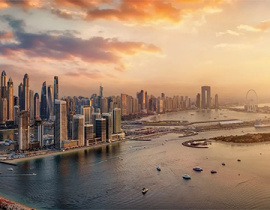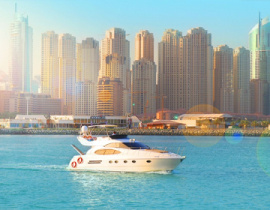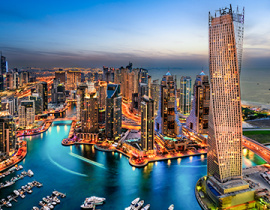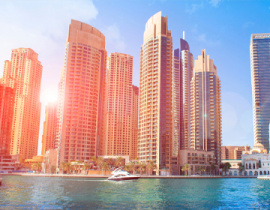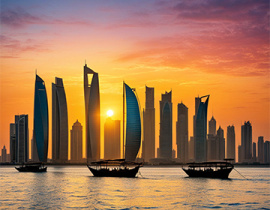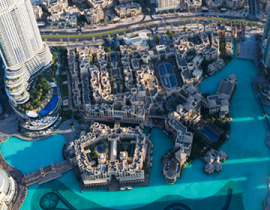- Home
- Blog
- Market News
- Dubai Ranks Among Top 3 Global Luxury Housing Markets for Price Growth
Dubai Ranks Among Top 3 Global Luxury Housing Markets for Price Growth
Dubai’s prime residential market is thriving in 2025, even as other global hubs slow. Politic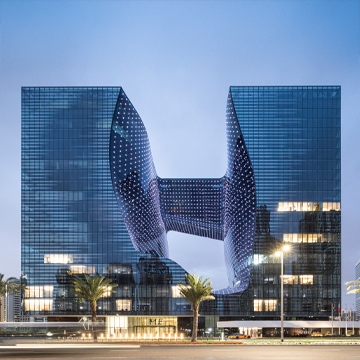 al instability in Europe, Asia, and the Middle East has pushed investors to redirect capital to the emirate. Global market volatility has increased interest in safe havens, which strengthens Dubai’s appeal as a secure place for high-value assets. This demand is further supported by the UAE’s GDP growth of 3.2% in 2024, powered by a 13.6% jump in logistics. The city’s stable economy, paired with its neutral geopolitical stance, reassures high-net-worth individuals who seek protection from currency risks and regional conflicts. Insights from the latest Dubai residential market report also confirm that investors are interested in luxury real estate.
al instability in Europe, Asia, and the Middle East has pushed investors to redirect capital to the emirate. Global market volatility has increased interest in safe havens, which strengthens Dubai’s appeal as a secure place for high-value assets. This demand is further supported by the UAE’s GDP growth of 3.2% in 2024, powered by a 13.6% jump in logistics. The city’s stable economy, paired with its neutral geopolitical stance, reassures high-net-worth individuals who seek protection from currency risks and regional conflicts. Insights from the latest Dubai residential market report also confirm that investors are interested in luxury real estate.
Strong government policies have also made Dubai more attractive to foreign buyers. The emirate offers zero income, capital gains, and inheritance taxes on property transactions, which lifts net returns for investors. For many, this creates what feels like a tax-free heaven Dubai, reinforcing its global draw. Full freehold ownership has been available to non-residents in key zones such as Palm Jumeirah and Dubai Marina since 2002, and this continues to pull global capital. Long-term Golden Visas, tied to property purchases, give investors the option to secure ten-year residency, which encourages permanent settlement. At the same time, digital platforms like the REST app, along with escrow protections under the Dubai Land Department, have reduced transaction risks and settlement delays.
Lifestyle, Security, and Cultural Factors Drawing Global Buyers to Dubai
Dubai’s lifestyle offerings continue to be a strong driver of demand. The city has world-class developments like The Palm and Bluewaters Island, along with advanced transport systems and smart-city projects. It consistently ranks high for personal and property safety, which makes it appealing to families and business leaders alike. Cultural growth has also been rapid, with new galleries, museums, and performing arts venues supporting a vibrant scene. International events such as Art Dubai and the Dubai World Cup add further to its cosmopolitan appeal. Analysts tracking the Dubai residential property market trends 2025 point to lifestyle upgrades as a defining force. Broader Dubai property market analysis also shows that luxury demand is closely tied to cultural and infrastructure investment.
L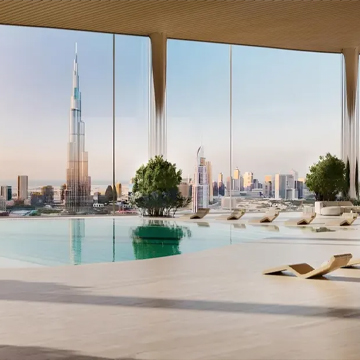 ooking ahead, a detailed Dubai residential market overview suggests that the city will remain resilient despite global economic headwinds. The expanding Dubai residential real estate market reflects confidence from both institutional and private investors. With developers aligning projects to international demand, the Dubai property market forecast remains optimistic. As a whole, the Dubai residential property market continues to evolve with strong fundamentals, and the Dubai residential market 2025 is set to strengthen Dubai’s position as a leading global hub.
ooking ahead, a detailed Dubai residential market overview suggests that the city will remain resilient despite global economic headwinds. The expanding Dubai residential real estate market reflects confidence from both institutional and private investors. With developers aligning projects to international demand, the Dubai property market forecast remains optimistic. As a whole, the Dubai residential property market continues to evolve with strong fundamentals, and the Dubai residential market 2025 is set to strengthen Dubai’s position as a leading global hub.
Limited Supply of Properties Increasing Demand in Dubai
While demand grows, the supply of prime properties remains tight. Only 19,700 new villas are expected by the end of 2025, which falls short of rising demand. In 2024, villa prices surged 26%, and the shortage has pushed values even higher in early 2025. Completion rates for new projects remain low, with just 62% of planned units expected to be delivered this year. This supply lag fuels competition in luxury segments and pushes prices upward, particularly for waterfront homes and prime residential property in Dubai. With demand outpacing delivery, analysts expect values in the high-end residential market to climb between 5% and 8% annually through 2025.
Dubai’s Investor Profiles Show Preference for Income and Stability
Global data shows capital value growth at just 0.7% in early 2025, but Dubai’s prime market continues to outpace that trend. Rental values globally rose by 2%, signaling stronger income opportunities, and Dubai has shown even higher rental yield performance. Analysts cite Dubai real estate market growth as a reason the emirate stands apart from other hubs. The city’s luxury properties draw investors because they provide both reliable rental income and potential for long-term gains. This dual strength reflects Dubai’s reputation as one of the most resilient prime markets worldwide.
The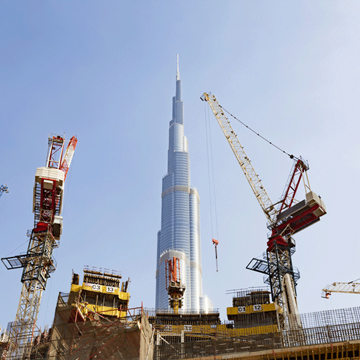 profile of buyers in Dubai’s luxury segment reflects this focus on security and returns. High-net-worth individuals, retirees, and digital entrepreneurs are driving demand, and many of them prefer assets that generate steady income over uncertain capital appreciation. Analysts point to rising Dubai prime real estate demand as a key driver behind villa and waterfront apartment purchases. Investors are looking for properties that can deliver both prestige and reliable yields, especially in segments defined as high-end property in Dubai.
profile of buyers in Dubai’s luxury segment reflects this focus on security and returns. High-net-worth individuals, retirees, and digital entrepreneurs are driving demand, and many of them prefer assets that generate steady income over uncertain capital appreciation. Analysts point to rising Dubai prime real estate demand as a key driver behind villa and waterfront apartment purchases. Investors are looking for properties that can deliver both prestige and reliable yields, especially in segments defined as high-end property in Dubai.
Strong Fundamentals Support Long-Term Property Demand in Dubai
Some global cities are facing higher taxes, foreign buyer surcharges, and tighter ownership rules, which put pressure on property investors. These policies often reduce net returns and slow down transactions. Dubai has avoided such sudden shifts and has kept its system clear and stable. No income tax, no capital gains tax, and no inheritance tax on property create predictability, and regulatory bodies like RERA and the Dubai Land Department continue to oversee transactions with transparency. This consistency has strengthened investor trust. The strength of Dubai's prime residential investments reflects how policies and clear regulations attract global capital. Analysts offering Dubai housing market predictions highlight these fundamentals when advising clients on why they should invest in Dubai real estate.




